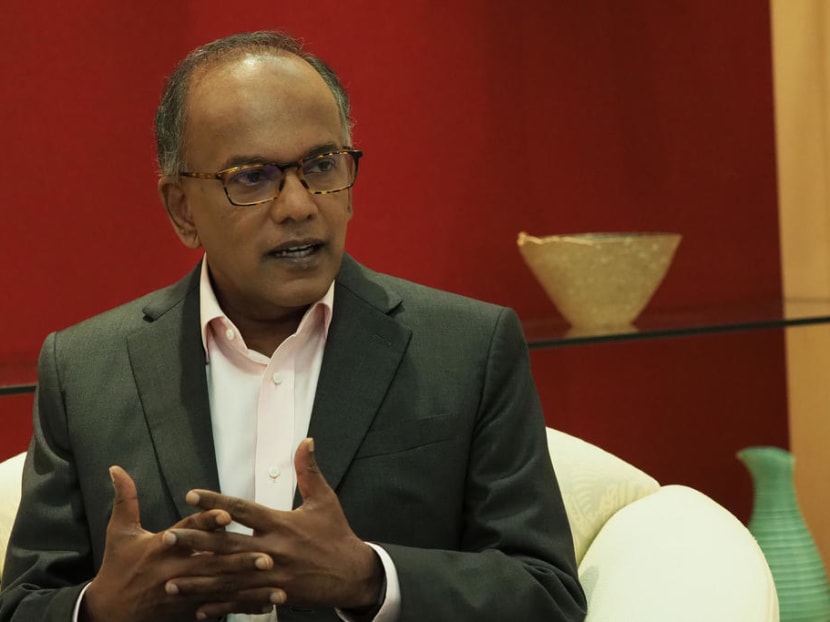Hong Kong’s example shows Singapore’s strict stance against illegal protests is warranted: Shanmugam
SINGAPORE — Despite criticism for not allowing protests outside of Speakers’ Corner, Home Affairs and Law Minister K Shanmugam stressed that Singapore’s strict approach is a right one.

Mr K Shanmugam said Hong Kong’s situation shows that protests cannot be seen solely as a law and order issue but also one of governance.
SINGAPORE — Despite criticism for not allowing protests outside of Speakers' Corner, Home Affairs and Law Minister K Shanmugam stressed that Singapore’s strict approach is a right one.
The public protests in Hong Kong have shown that even the best police force in the world cannot handle a full-fledged public order crisis, he said.
Mr Shanmugam was replying to Member of Parliament for Ang Mo Kio Group Representation Constituency Gan Thiam Poh’s question of what Singapore can learn from the unrest in Hong Kong, during the Ministry of Home Affairs’ (MHA) committee of supply debate on Monday (March 2).
Hong Kong’s police force used to be considered one of the finest and most highly regarded in Asia, as it was disciplined, professional and well respected by its residents, he said.
Today, however, the Hong Kong police force is “seriously stretched” — caught between the need to uphold public order and protesters who have resorted to increasingly violent tactics just to attack the police and instigate them, said Mr Shanmugam.
They also face persistent criticism both domestically and internationally, he added, pointing out that they even have to fend off protesters targeting their family and loved ones when they are off-duty.
The key lesson to be gleaned from here, he said, is that “the actions of a disaffected few should not be allowed to threaten the rights of the majority to live in a stable, peaceful society”.
Reiterating that Singapore takes a zero-tolerance approach to illegal demonstrations and protests, he said: “Where do we draw the line? One, two, three, 30, 50, 100, 200, 5,000? How many protesters are acceptable?
“How do we tell what will be a peaceful protest and what will escalate into violence?”
He said that part of the issue in Hong Kong is that protests are allowed and police are only allowed to intervene when they turn violent.
“By the time you have 50,000 people on the streets… let’s say 500 (are) deliberately intent on creating violence, how do the police handle this? This sets up the police for failure and sets up the police to be the fall guys.”
Mr Shanmugam pointed out that Singapore is not the only country to have clamped down on protests.
Some countries that have traditionally upheld freedom of expression had also done so when it “comes to the crunch”, he said.
For example, Denmark, which hosted a United Nations climate conference in Copenhagen in 2009, constructed a holding facility by setting up 36 steel cages that could hold more than 350 people in anticipation of widespread protests.
London’s metropolitan police, meanwhile, banned the non-violent Extinction Rebellion protests that blocked roads and disrupted train services and arrested more than 1,800, he said.
RELYING ON TOUGH LAWS ALONE WON’T WORK
Hong Kong’s situation shows that protests cannot be seen solely as a law and order issue but also one of governance, said Mr Shanmugam.
The Government must deliver good governance, such that a large majority feel that the society is fair and only a minority would want to break the laws and destabilise society.
Simply relying on tough laws is “not going to work”, he said.
“If a significant number of people believe that the system is fundamentally unfair — the socio-economic system and the benefits — and that it is set out to benefit a few at the expense of the majority… then no amount of strict policing and strict laws are going to keep people off the streets,” he said.
“Why should they support a system that is fundamentally unfair?”
Noting a common misunderstanding here that Singapore’s approach is based on “very strict punishments”, he said: “No. It is first and foremost based on making sure that the majority progress, and that the system is fair. Strict punishments can only be built on such a system.”











